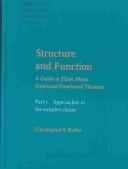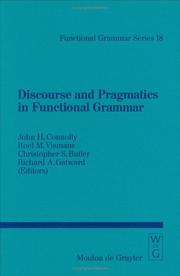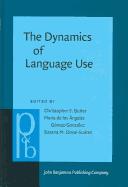| Listing 1 - 5 of 5 |
Sort by
|

ISSN: 01657763 ISBN: 9027230749 1588113612 9027230730 1588113604 9027230692 9027230706 9027230714 9027230722 9781588113603 9781588113610 1588113566 9781588113566 1588113574 9781588113573 9789027296535 9027296537 1282161253 9786612161254 1588113582 9786612161247 1282161245 9027296529 9789027230713 9789027230706 9789027230720 9789027230737 9789027230690 9789027230744 9789027296528 1588113590 Year: 2003 Volume: 63, 64 Publisher: Amsterdam Benjamins
Abstract | Keywords | Export | Availability | Bookmark
 Loading...
Loading...Choose an application
- Reference Manager
- EndNote
- RefWorks (Direct export to RefWorks)
Like its companion volume, this book offers a detailed description and comparison of three major structural-functional theories: Functional Grammar, Role and Reference Grammar and Systemic Functional Grammar, illustrated throughout with corpus-derived examples from English and other languages. Whereas Part 1 confines itself largely to the simplex clause, Part 2 moves from the clause towards the discourse and its context. The first three chapters deal with the areas of illocution, information structuring (topic and focus, theme and rheme, given and new information, etc.), and clause combining within complex sentences. Chapter 4 examines approaches to discourse, text and context across the three theories. The fifth chapter deals with the learning of language by both native and non-native speakers, and applications of the theories in stylistics, computational linguistics, translation and contrastive studies, and language pathology. The final chapter assesses the extent to which each theory attains the goals it sets for itself, and then outlines a programme for the development of an integrated approach responding to a range of criteria of descriptive and explanatory adequacy.
Lexicology. Semantics --- Psycholinguistics --- Comparative linguistics --- Grammar --- Structural linguistics --- Functionalism (Linguistics) --- Role and reference grammar --- Systemic grammar --- Functionalism (Linguistics). --- Role and reference grammar. --- Structural linguistics. --- Systemic grammar. --- 801.56 --- 801.56 Syntaxis. Semantiek --- Syntaxis. Semantiek --- Philology & Linguistics --- Languages & Literatures --- Neo-Firthian linguistics --- Scale-and-category grammar --- System-structure grammar --- Systemic linguistics --- Grammar, Comparative and general --- Linguistic analysis (Linguistics) --- Functional analysis (Linguistics) --- Functional grammar --- Functional linguistics --- Functional-structural analysis (Linguistics) --- Grammar, Functional --- Grammatical functions --- Linguistics
Book
ISBN: 1322080534 9027259224 9027270228 9789027259226 9789027270221 Year: 2014 Volume: 157 Publisher: Amsterdam Benjamins
Abstract | Keywords | Export | Availability | Bookmark
 Loading...
Loading...Choose an application
- Reference Manager
- EndNote
- RefWorks (Direct export to RefWorks)
This book, intended primarily for researchers and advanced students, expands greatly on previous work by the authors exploring the topography of the multidimensional "functional-cognitive space" within which functional, cognitive and/or constructionist approaches to language can be located. The analysis covers a broad range of 16 such approaches, with some additional references to Chomskyan minimalism, and is based on 58 questionnaire items, each rated by 29 experts on particular models for their importance in the model concerned. These ratings are analysed statistically to reveal overall patt
Cognitive maps (Psychology). --- Functionalism (Linguistics). --- Psycholinguistics. --- Space and time in language. --- Space and time in language --- Functionalism (Linguistics) --- Cognitive maps (Psychology) --- Psycholinguistics --- Languages & Literatures --- Philology & Linguistics --- Funktionalismus (Linguistik). --- Kognitive Landkarte. --- Raumwahrnehmung. --- Sprache. --- Zeitwahrnehmung. --- 801.56 --- 801.56 Syntaxis. Semantiek --- Syntaxis. Semantiek --- Language, Psychology of --- Language and languages --- Psychology of language --- Speech --- Maps, Cognitive (Psychology) --- Functional analysis (Linguistics) --- Functional grammar --- Functional linguistics --- Functional-structural analysis (Linguistics) --- Grammar, Functional --- Grammatical functions --- Psychological aspects --- Psychology --- Linguistics --- Thought and thinking --- Cognition --- Structural linguistics --- Mental models --- Models, Mental

ISBN: 3110151537 3110812231 9783110812237 9783110151534 Year: 1997 Volume: 18 Publisher: Berlin De Gruyter
Abstract | Keywords | Export | Availability | Bookmark
 Loading...
Loading...Choose an application
- Reference Manager
- EndNote
- RefWorks (Direct export to RefWorks)
No detailed description available for "Discourse and Pragmatics in Functional Grammar".
Discourse analysis. --- Functionalism (Linguistics) --- Pragmatics. --- Grammar --- Pragmatics --- Discourse analysis --- Analyse du discours --- Fonctionnalisme (Linguistique) --- Pragmatique --- Functional analysis (Linguistics) --- Functional grammar --- Functional linguistics --- Functional-structural analysis (Linguistics) --- Grammar, Functional --- Grammatical functions --- Pragmalinguistics --- General semantics --- Language and languages --- Logic, Symbolic and mathematical --- Semantics (Philosophy) --- Linguistics --- Structural linguistics --- Discourse grammar --- Text grammar --- Semantics --- Semiotics --- Philosophy

ISBN: 9027253838 9789027253835 9786612156472 1282156470 9027294186 9789027294180 9781282156470 6612156473 Year: 2005 Volume: 140 Publisher: Amsterdam Benjamins
Abstract | Keywords | Export | Availability | Bookmark
 Loading...
Loading...Choose an application
- Reference Manager
- EndNote
- RefWorks (Direct export to RefWorks)
This book brings together a collection of articles characterized by two main themes: the contrastive study of parallel phenomena in two or more languages, and an essentially functional approach in which language is regarded, first and foremost, as a rich and complex communication system, inextricably embedded in sociocultural and psychological contexts of use. The majority of the studies reported is empirical in nature, many making use of corpora or other textual materials in the language(s) under investigation. The book begins with an introductory section in which the editors provide surveys of the state of the art in both functional and contrastive linguistics. The other five sections of the volume are devoted to (i) a cognitive perspective on form and function, (ii) information structure, (iii) collocations and formulaic language, (iv) language learning, and (v) discourse and culture.
Contrastive linguistics --- Functionalism (Linguistics) --- Sociolinguistics --- Psycholinguistics --- 800:316 --- 800:159.9 --- 800:316 Sociolinguistiek --- Sociolinguistiek --- 800:159.9 Taalwetenschap. Taalkunde. Linguistiek-:-Psychologie: zie ook: Psychiatrie: n-{616.89-008} en n-{615.851} --- Taalwetenschap. Taalkunde. Linguistiek-:-Psychologie: zie ook: Psychiatrie: n-{616.89-008} en n-{615.851} --- Language and culture --- Linguistics --- Sociology --- Integrational linguistics (Oxford school) --- Contrastive linguistics - Congresses --- Functionalism (Linguistics) - Congresses --- Sociolinguistics - Congresses --- Psycholinguistics - Congresses
Book

ISBN: 1282196480 9786612196485 3110205378 9783110205374 9781282196483 3110198673 9783110198676 6612196483 Year: 2008 Publisher: Berlin Boston
Abstract | Keywords | Export | Availability | Bookmark
 Loading...
Loading...Choose an application
- Reference Manager
- EndNote
- RefWorks (Direct export to RefWorks)
The articles in this volume analyse the noun phrase within the framework of Functional Discourse Grammar (FDG), the successor to Simon C. Dik's Functional Grammar. In its current form, FDG has an explicit top-down organization and distinguishes four hierarchically organized, interacting levels: (i) the interpersonal level (language as communicational process), (ii) the representational level (language as a carrier of content), (iii) the morphosyntactic level and (iv) the phonological level. Together they constitute the grammatical component, which in its turn interacts with a cognitive and a communicative component. This comprehensive approach to linguistic analysis is also reflected in this volume, which contains rich and substantial contributions concerning many different aspects of the noun phrase. At the same time, the analysis of a major linguistic construction from various perspectives is an excellent way to test a new model of grammar with regard to some of the standards of adequacy for linguistic theories. The book contains several papers dealing with matters of representation and formalization of the noun phrase (the articles by Kees Hengeveld, José Luis González Escribano, Jan Rijkhoff and Evelien Keizer). Other contributors are more concerned with the practical application of the model with regard to discourse-interpersonal matters (Chris Butler, John H. Connolly), whereas the chapters by Dik Bakker and Roland Pfau and by Daniel García Velasco deal with morphosyntactic issues. In all, the variety of issues addressed and the range of languages considered prove that one of the important advantages of the FDG model is precisely the fact that grammatical phenomena can be treated from a semantic, pragmatic, morpho-syntactic, phonological or textual perspective in a coherent fashion.
Grammar, Comparative and general --- Functional discourse grammar. --- Functional grammar --- Discourse analysis --- Functionalism (Linguistics) --- Noun phrase --- Subject (Grammar) --- Noun phrase. --- Complex nominals --- Subject --- Nominals --- Linguistics --- Philology --- Functional Grammar. --- syntax.
| Listing 1 - 5 of 5 |
Sort by
|

 Search
Search Feedback
Feedback About UniCat
About UniCat  Help
Help News
News